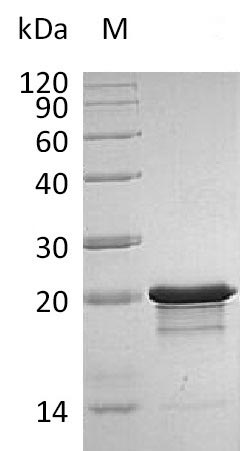Recombinant Human Fibroblast Growth Factor 8 (FGF8) is produced in an E. coli expression system and spans the full mature protein length of Isoform FGF-8B, specifically amino acids 23-215. This tag-free protein shows a purity level exceeding 95%, as verified by SDS-PAGE analysis. The protein demonstrates biological activity with an ED50 of 21.87 ng/ml in a cell proliferation assay using BALB/c 3T3 cells. Endotoxin levels remain below 1.0 EU/µg, determined by the LAL method.
Fibroblast Growth Factor 8 (FGF8) belongs to the fibroblast growth factor family and appears to play a critical role in embryonic development and cell growth. It participates in several signaling pathways that influence cell division, differentiation, and survival. FGF8's research value likely stems from its involvement in various developmental processes, which makes it a useful tool for studying cellular growth mechanisms and developmental biology.
Potential Applications
Note: The applications listed below are based on what we know about this protein's biological functions, published research, and experience from experts in the field. However, we haven't fully tested all of these applications ourselves yet. We'd recommend running some preliminary tests first to make sure they work for your specific research goals.
1. Cell Proliferation and Growth Factor Signaling Studies
This recombinant FGF8 is confirmed to be biologically active (ED₅₀ 21.87 ng/ml in BALB/c 3T3 cells) and suitable for proliferation and signaling studies. However, the moderate potency (ED₅₀ in the ng/ml range versus pg/ml for some growth factors) may require careful dose optimization in different cell types. The E. coli expression produces a non-glycosylated protein, but the demonstrated activity suggests proper folding for core FGF receptor interactions. Researchers should validate signaling pathways (e.g., MAPK, PI3K) in their specific cell models to ensure physiological relevance.
2. Developmental Biology Research
The protein is appropriate for developmental studies, but the E. coli expression lacks mammalian post-translational modifications that may influence FGF8's function in complex morphogenetic processes. Researchers should validate its activity in organoids, explants, or primary cultures to confirm it recapitulates native FGF8 roles in patterning and cell fate decisions. The moderate potency may necessitate higher concentrations in 3D cultures or tissue environments compared to monolayer cell assays.
3. Receptor Binding and Interaction Studies
The tag-free design is advantageous for binding studies, but the non-glycosylated state may alter binding kinetics compared to native FGF8, though FGF8 is not heavily glycosylated. The confirmed bioactivity supports receptor engagement, but researchers should validate binding affinities (e.g., with FGFRs and heparan sulfate) using mammalian-expressed FGF8 as a reference for precise kinetic measurements. The moderate potency may reflect reduced affinity due to expression system differences.
4. Antibody Development and Validation
This high-purity FGF8 serves as a good antigen, but antibodies generated against this E. coli-expressed protein may not recognize epitopes dependent on mammalian modifications. The confirmed activity indicates proper conformational epitopes, but comprehensive validation should include testing against mammalian-expressed or native FGF8 from biological sources to ensure recognition of physiological forms.
5. Biochemical Characterization and Protein Stability Studies
The protein is suitable for biochemical studies, but the E. coli expression may result in aggregation or solubility issues not present in mammalian-expressed FGF8. The high purity supports techniques like circular dichroism or thermal shift assays, but researchers should correlate stability data with functional activity to confirm native-like behavior. The moderate potency may indicate sensitivity to denaturation under some conditions.
Final Recommendation & Action Plan
This recombinant human FGF8 (isoform FGF-8B) is a functional tool with confirmed bioactivity, but its E. coli expression and moderate potency require careful experimental design. Prioritize dose optimization (start with 10-100 ng/ml based on ED₅₀) for each application, as potency may vary across cell types and assays. For developmental studies, validate effects in complex models like organoids with mammalian-expressed FGF8 controls. The tag-free design benefits binding and interaction studies, but verify key kinetics with glycosylated FGF8 if available. When developing antibodies, use this protein for immunization, but validate against native FGF8 to ensure physiological relevance. For biochemical studies, monitor aggregation and correlate stability with activity. Always include appropriate controls (e.g., vehicle, inactive protein) to account for expression system-related artifacts.




